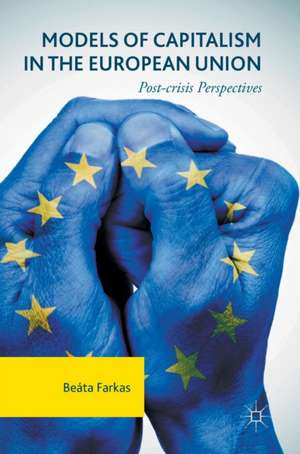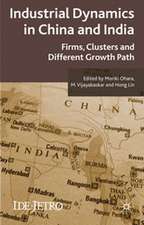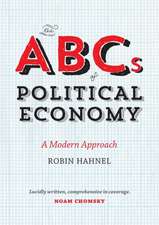Models of Capitalism in the European Union: Post-crisis Perspectives
Autor Beáta Farkasen Limba Engleză Hardback – 21 sep 2016
Models of Capitalism in the European Union serves as a useful handbook for academics, advanced students, policy-makers and advisors who are interested in European economic issues.
| Toate formatele și edițiile | Preț | Express |
|---|---|---|
| Paperback (1) | 649.39 lei 6-8 săpt. | |
| Palgrave Macmillan UK – 12 iun 2018 | 649.39 lei 6-8 săpt. | |
| Hardback (1) | 653.79 lei 6-8 săpt. | |
| Palgrave Macmillan UK – 21 sep 2016 | 653.79 lei 6-8 săpt. |
Preț: 653.79 lei
Preț vechi: 769.17 lei
-15% Nou
Puncte Express: 981
Preț estimativ în valută:
125.11€ • 129.77$ • 104.32£
125.11€ • 129.77$ • 104.32£
Carte tipărită la comandă
Livrare economică 27 martie-10 aprilie
Preluare comenzi: 021 569.72.76
Specificații
ISBN-13: 9781137600561
ISBN-10: 113760056X
Pagini: 488
Ilustrații: XXI, 541 p. 11 illus.
Dimensiuni: 148 x 210 x 35 mm
Greutate: 0.79 kg
Ediția:1st ed. 2016
Editura: Palgrave Macmillan UK
Colecția Palgrave Macmillan
Locul publicării:London, United Kingdom
ISBN-10: 113760056X
Pagini: 488
Ilustrații: XXI, 541 p. 11 illus.
Dimensiuni: 148 x 210 x 35 mm
Greutate: 0.79 kg
Ediția:1st ed. 2016
Editura: Palgrave Macmillan UK
Colecția Palgrave Macmillan
Locul publicării:London, United Kingdom
Cuprins
Introduction.- PART I: Institutional Analysis in Economics.- 1. Institutions in the Economic Thought.- 2. The Models of Capitalism – Comparative Institutional Analyses.- PART II: Models of the Market Economy in the EU at the Threshold of the Global Financial and Economic Crisis of 2008.- 3. An Empirical Analysis of the Economic System.- 4. Models of Capitalism in the Enlarged EU.- PART III: Market Economies of the EU in the 2008 Global Crisis.- 5. Crisis-resistant Nordic Countries?.- 6. Different Development Paths in the North-Western Countries.- 7. The Search for a Way Out in the Mediterranean Countries.- 8. Crisis Management in the Central and Eastern European Member States.- PART IV: European Integration of the Varieties of Capitalism.- 9. Classification Based on the Driving Factors of the Crisis and the Models of Capitalism.- 10. Lessons to Learn from the Institutional Analysis.- 11. Models of Capitalismand the Future of the European Integration.
Recenzii
“The volume represents a powerful and constructive voice in the debate on modern economic systems … . Well-argued, well-written and well-presented, this monograph will be of interest to economists and political scientists as well as experts and analysts. Due to the rich selection of graphs, tables and figures, it will prove an invaluable source for lecturers to structure their lectures and for students, at undergraduate and graduate level, as a companion to a variety of modules across the field.” (Anna Visvizi, Yearbook of the Institute of East-Central Europe, Vol. 14 (4), 2016)
Notă biografică
Beáta Farkas is Professor and Head of the Institute of Finance and International Economic Relations at the University of Szeged, Hungary. She joined the university after obtaining degrees in both Law and Economics, and now holds a PhD in Economics. She was the founding Dean of the Faculty of Economics and Business Administration.
Textul de pe ultima copertă
This book uses comparative economic analysis to provide a common conceptual framework for all current European Union member states. Based on empirical investigation, the author identifies the Nordic, North-western, Mediterranean, and Central and Eastern models of capitalism on the threshold of the 2008 global financial and economic crisis. The chapters also examine the resulting institutional responses to the crisis and the methods of crisis management adopted by each member state. The analysis reveals that the crisis has not triggered radical institutional change but, instead, highlighted deep institutional differences not between the old and new member states, but between the Nordic, North-western, Mediterranean, and Central and Eastern European countries. These institutional differences are so significant that they require the rethinking of European integration theory.
Models of Capitalism in the European Union serves as a useful handbook for academics, advanced students, policy-makers and advisors who are interested in European economic issues.
















